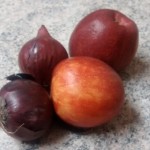 Flavonoids are bioactive polyphenolic plant compounds that may have health benefits in humans. In particular, flavonoids may be protective of cardiovascular disease if consumed regularly. The mechanism by which flavonoids may confer protection from cardiovascular disease is not known. However, flavonoids have been shown to inhibit low density lipoprotein (LDL) oxidation and inhibit platelet aggregation in vitro, and thus may have anti-atherosclerotic and anti-thrombotic tendencies. A number of epidemiological studies have investigated the association between flavonoids and cardiovascular disease. One of the earliest and better known studies, the Zutphen Elderly study1, is often cited in literature regarding the beneficial effects of flavonoids. The Zutphen Elderly Study was designed as a longitudinal investigation to report on the relation between baseline intake of flavonoids and the subsequent mortality from cardiovascular disease in elderly men. It was named after the Dutch town where the data for the research was collected.
Flavonoids are bioactive polyphenolic plant compounds that may have health benefits in humans. In particular, flavonoids may be protective of cardiovascular disease if consumed regularly. The mechanism by which flavonoids may confer protection from cardiovascular disease is not known. However, flavonoids have been shown to inhibit low density lipoprotein (LDL) oxidation and inhibit platelet aggregation in vitro, and thus may have anti-atherosclerotic and anti-thrombotic tendencies. A number of epidemiological studies have investigated the association between flavonoids and cardiovascular disease. One of the earliest and better known studies, the Zutphen Elderly study1, is often cited in literature regarding the beneficial effects of flavonoids. The Zutphen Elderly Study was designed as a longitudinal investigation to report on the relation between baseline intake of flavonoids and the subsequent mortality from cardiovascular disease in elderly men. It was named after the Dutch town where the data for the research was collected.
In the study, the flavonoid intake of 805 men aged 65-84 years was assessed by the cross-check dietary history method. The main dietary sources of flavonoids were black tea (61%), onions (13%) and apples (10%). At 5 year follow-up, the risk of mortality from cardiovascular disease and incidence of first myocardial infarction were about 50% lower for the highest flavonoid intake compared to the lowest intake. Adjustments for total consumption of fruits and vegetables did not greatly affect the strength of the relationship between flavonoid intake and myocardial infarction or cardiovascular disease mortality. Consumption of tea was inversely related to mortality from cardiovascular disease, showing a borderline significance, but apple consumption was not. Although the power of the study is limited owing to the small number of deaths and incident cases, the association with cardiovascular disease mortality was highly significant. Adjustment for dietary variable and for non-dietary risk factors, such as physical activity and obesity did not attenuate the relationship.
RdB
